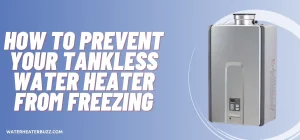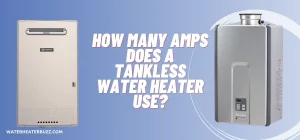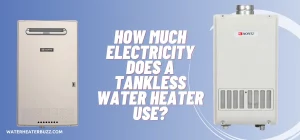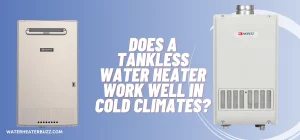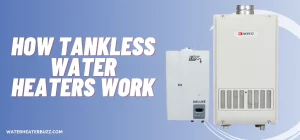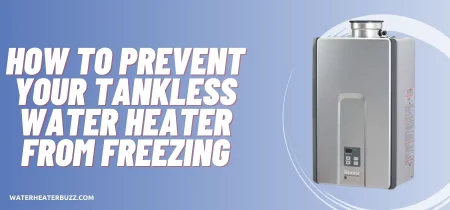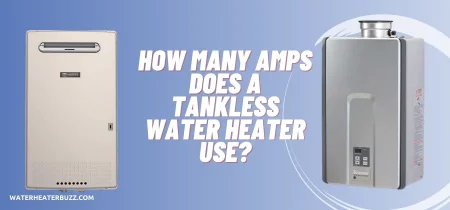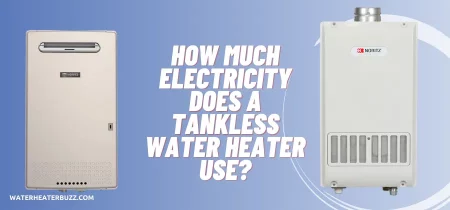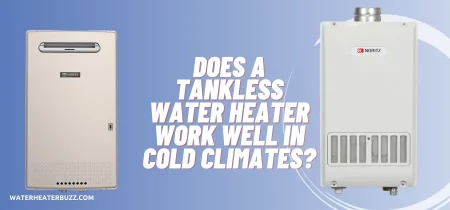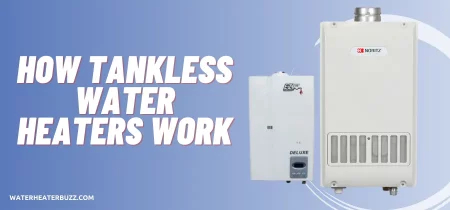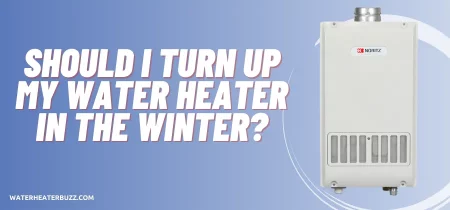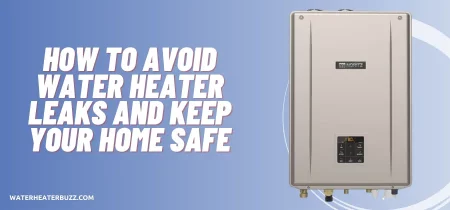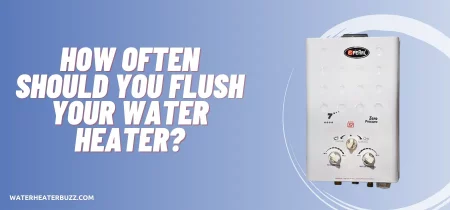A water heater has been a Godsend commodity for me, especially in this bone-freezing weather. While shopping for it, what I did not know was that there isn’t just one but 5 different types of water heaters. That put me in a lot of confusion, but I managed to find the one that suited me best.
Many of you struggle to find the right one; therefore, this article will help you understand the types of water heaters and which one to buy.
What is A Water Heater
A water heater is a household appliance that heats water using certain technologies. It is either operated via electricity or gas, depending upon its type and usage. It seems impossible to live without a water heater in places where extreme cold falls in today’s world. There are quite a few types of water heaters which we will discuss in the next section.
Types of Water Heater
1. Conventional Water Heater
A conventional water heater is the most widely used heater which has been and is still in use in many households. They are either operated by electric or gas energy. These appliances come in various sizes depending upon your requirement and the people living in your home.
Conventional water heaters come with a heating part and a water tank. The tank stores water in large quantities, heated and stored as warm water. This water heater is less pricey than the other types and has low maintenance.
Pros
- Conventional water heaters are less pricier than the types of water heaters. They are comparatively easy to install and have a lower upfront cost.
- These water heaters have lower maintenance and work in almost all weather conditions. Extreme weather conditions have no side effects on these heaters because they are thoroughly insulated.
- Conventional water heaters are less pricey to install and come with various water holding capacities. You can opt for a huge tank depending upon your household usage.
Cons
- Corrosion of the elements is something you cannot avoid. Just because it holds water in a tank for a long time, therefore, corrosion is unavoidable. You need to regularly check for such happenings to perform optimally.
- Conventional heaters use a constant energy supply; therefore, be prepared for a load of bills at the end of the month. Most of the conventional heaters are operated through gas, making them very expensive for people.
- One of the downsides of conventional water heaters is that they require a constant energy supply to operate and supply warm water fully. These heaters will not work if the energy supply is stopped.
2. Tankless Water Heater
A tankless water heater is one of my favorites because of its small size and energy efficiency. These heaters are compact and can fit under the washbasins. Such a water heater heats water instantaneously on demand. It comes with coils that heat at a very high temperature.
When you open up a tap, the tankless water heater takes that water; it operates and heats the water immediately. This type of water heater does not store water like conventional heaters.
Pros
- Tankless water heaters offer an instant warm water supply and prevent you from waiting. You get steaming hot water when you demand it. Unlike conventional water heaters, tankless water heaters use less energy; therefore, you get fewer bills at the end of the month.
- Another fantastic advantage of the tankless heater is that it has less footprint. Meaning tankless heaters save a lot of space, unlike conventional heaters. You can install it in the bathrooms kitchens directly to the water supply. These heaters can also fit under the washbasin, which is a win-win.
- I am sure people will love tankless water heaters because of their low monthly cost. As they supply on-demand hot water, therefore, the tankless water heaters use less energy. As a result, you get low bills at the end of the month, which is a great relief.
Cons
- The main issue with the tankless water heater is that they come with high installation costs. Other than that, they are costly to buy and have a high plumbing cost.
- Sadly, tankless water heaters aren’t for larger families. If you have many people living in one household, you need to install several tankless water heaters, which might cost you an arm and a leg. One heater can be a hassle if you install it to the main water supply because it warms only a small quantity of water.
3. Heat Pump Water Heater
Heat pump water heaters are the most energy-efficient heater known to date. They are also known as hybrid heaters. Such a heater does not warm the water by directly generating heat.
They take heat from underground and use electric energy to transfer it from one point to another. This heat is then used to warm your domestic water supply.
Pros
- People love heat pump water heaters for their low month-to-month cost. As we know now, that heat pump water heater uses electric energy only to transfer heat from one point to another; therefore, you will get to see fewer bills at the end of the month.
- These water heaters are long-lasting and are highly efficient. They also require minimal maintenance, which makes them very famous. Moreover, the installation process is easy and mess-free. You only need to get it checked annually.
Cons
- You will need at least 1,000 cubic feet area to accommodate it properly.
- The other downside of this water heater is that it requires a huge space. It isn’t for the people having space issues because the heat pump water heater isn’t for.
- Everything has come with a downside. Heat pump water heater also has its setbacks. First of all, they have a lesser life span than conventional, tankless, and solar water heaters. You might end up a replacement after 10 years of usage.
4. Solar Water Heaters
As the name suggests, solar water heaters are operated by consuming solar energy. I love these heaters because they use sunshine to operate, and the sunlight is absolutely free.
While it is an efficient water heating system, you need a lot of money to install it. These heaters have solar panels and storage tanks where warm water is stored. The collector tanks collect water from the household water supply and use solar energy to heat it. Which is then later delivered to you.
Pros
- A solar water heater is the most energy-efficient type, as it uses free solar energy to generate heat. It might come with a bit of installation cost, but overall, the running cost would be zero because the sun doesn’t cost you anything to give you energy. Other than that, it is eco-friendly since there is no carbon production like other water heaters.
- Solar water heaters are long-lasting, and there isn’t much maintenance required. You can do an annual inspection to check for any damages which can be corrected.
Cons
- The major drawback which these solar water heaters come with is the installation cost. Although they don’t throw high utility bills at you, the installation cost is hefty. It is because you aren’t just installing the heater, but also the solar panels and collectors.
- Some regions have harsh climates where people don’t get enough sunshine and the days are relatively shorter. Unfortunately, solar water heaters don’t work optimally in those regions as they need a constant supply of sunshine.
5. Condensing Water Heater
Condensing water heater uses a technology that cleverly captures the exhausted gases and prevents them from escaping into the environment.
Although they work on the principles of conventional water heaters, they use exhausted gases to heat the water. This makes them extremely energy efficient. It involves the condensation of water vapors in the flue pipes, which are used for heat exchange.
Pros
- Not only are condensing water heaters good for the environment, but they are also highly energy savers. These heaters cut your energy consumption by 30 percent and save the environment big time. They also prevent the emission of carbon and other greenhouse gases into the atmosphere.
- These heaters are highly efficient in their operation and spare you from waiting longer for warm water. The water storage tank instantly heats the water as soon as it is filled. Also, condensing water heaters require less maintenance than other water heaters.
Cons
- Condensing water heaters are highly pricey and have a huge installation cost. You need to give a lot of money to get one, and the plumbing cost is excellent because it requires a unique configuration. You need to set the condenser with the flue pipes to get it to work.
- Condensing water heaters is a big no-no for small households or generally all homes. The reason being their size, they come with huge water tanks, capable of storing upto 60 gallons of water. Moreover, they need maximum exhaust gases to generate much heat required to warm the water. Therefore, they are better off in commercial areas.
Frequently Asked Questions
What does a water heater do?
As the name suggests, a water heater heats the water to a temperature bearable for your skin for use. The water heater takes water from the main water supply and heats it with the help of built-in elements. This heated water is then delivered to you in bathroom/kitchen taps, showers, and bath areas. Water heaters are an essential commodity, especially in cold weather, to get you an unlimited warm water supply.
What are the water heaters types?
There are 5 main types of water heater, the job of which is the same but all of them have a few differences. For instance, there is a conventional water heater that has been in use for many years. Then there is a tankless, solar, condensing, and heat pump water heater. All of these water heaters operate on different technologies and work tremendously.
What is the downside of a water heater?
The fundamental issue that is unavoidable and faced by almost everyone who has a water heater is leakage. Your water heater, regardless of its type, will start to leak eventually. The reason is that the elements and the pipes begin to corrode with water causing tiny cracks in the system, which causes leakage. This issue isn’t big but recurrent. The cracks can be welded, but you have to do that repeatedly.
Final Thoughts
A water heater is a necessity nowadays, and it seems like no household can function without one. They are beneficial specifically in cold weather because you get to enjoy warm water on your skin for ultimate comfort.
Water heaters come in many shapes and sizes depending upon your requirement, budget, and much more. Generally, there are 5 basic types of water heaters that run on various technologies to heat your domestic water supply. I have listed all those types in the above section, so you have an easy time shopping.

